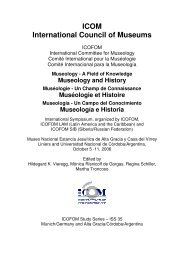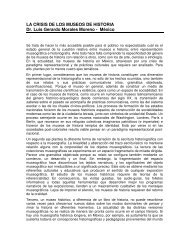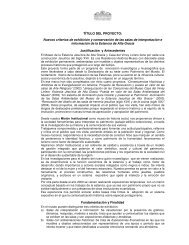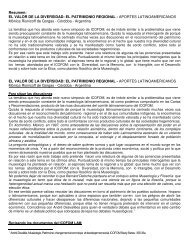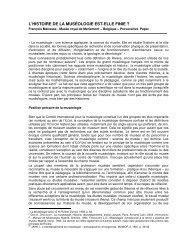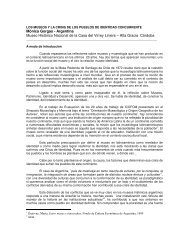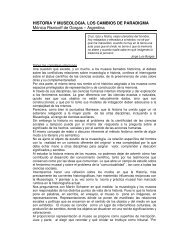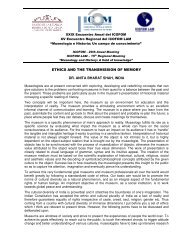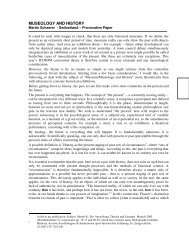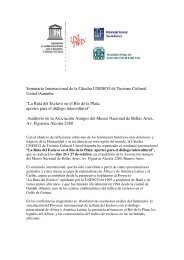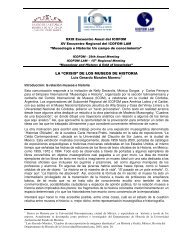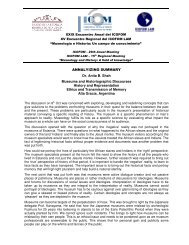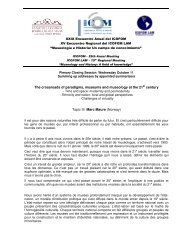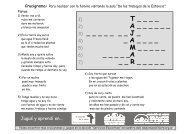MUSEOLOGY AND THE INTERPRETATION OF REALITY: THE ...
MUSEOLOGY AND THE INTERPRETATION OF REALITY: THE ...
MUSEOLOGY AND THE INTERPRETATION OF REALITY: THE ...
- No tags were found...
You also want an ePaper? Increase the reach of your titles
YUMPU automatically turns print PDFs into web optimized ePapers that Google loves.
At present, it is not possible to disregard the mythical character which definescultures in their genesis and in their core, or the influence of myth in the constitution of avery rich symbolic universe that impregnates, in the most varied forms, the mechanismsof representation. Museums do not care so much in recreating the world starting from acenter or a pre-given idea: they now tend to present things in multiplicity, exposing themas they are - singular, fascinating fragments of reality. And each one of us must findwithin ourselves the meanings that can be assigned to them.To think History and Museum implies, thus, in trying to understand how thecircular (or cyclic) temporalities of Tradition articulate with the linear, focused temporalitywhich characterizes the ‘occidental’ (historic) mode of thinking reality; and also toperceive how evidences articulate, both among themselves and with the documentalfragments that signify them. It is imperative to think about the ways and forms throughwhich museums represent the synthesis of those tendencies, specially in what refers tothe narratives they elaborate.The emotional character of museological language must be also taken intoaccount: that which makes possible to impregnate, in every way, the senses of thereceiver - or even articulate, with passion, all the actors of the communicational process(a process that historiography relegates to a second plan). It is important to rememberthat both History and museums operate with re-readings of reality, through memory; andthat the different configurations of History, promoted by museums, depend of intrinsicrelationships that each museum establishes both with memory and with History, in eachtime and place. Such process develops through operations of presentation of the vestigesof facts and phenomena which remain in the memory, as elaborated by historicalnarrative.But the question does not wear out in the relationship between historiography andmuseography. It goes beyond: how is it that History represents museums? And howmuseums represent History? Which History they represent?1.1 – Memory, evocation, representationAlthough definitely social, the process of memory initiates as an individualprocess, directly related to self-perception and to the perception of the inner and outsideworlds to which each individual relates. This ‘private’ 5 memory is defined by means ofthe intertwining of voluntary and involuntary movements of perception, where past andpresent experiences are in close and permanent contact. Past is projected onto thepresent, by means of mental and sensorial representations, contributing for the shapingof ‘sceneries’ where the individual behaves as observer and/or acting character 6 . Thesum of the tangency nodes of such sceneries constitutes that which Halbwachsnominates as ‘social memory’- a process of articulation of remains that are common todetermined human groups, and that would be at the base of the movements thatconstitute group identities. About this process, Nora adds that what comes to us bymanipulation of remains is no longer memory, it is already history 7 ; we could thus saythat, although memory and history are not the same things, social memory is impregnatedwith historicism.But to sense the world in historicism does not signify to understand it only throughthe viewpoints of History, or to enunciate it through the discourse of History. Culture,says Sahlins, functions as a space of encounter, ‘a synthesis of stability and change, of5 (as studied by Freud, Bergson and Proust)6 See Erwin Goffman’s works7 NORA, Pierre, apud CERTEAU, Michel de. Op. Cit.3



